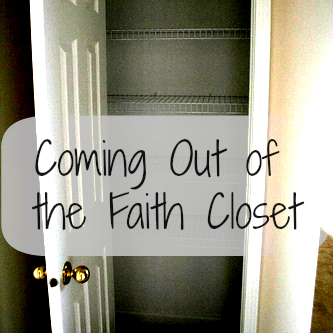Spiritual baggage. We all have it, whether we’ve stayed in our birth religion or if we’ve left it like a bad ex. Like relationship baggage, it tints all new spiritual experiences. We can’t help but compare new experiences, rituals, and beliefs to old ones. It’s a part of how we think, really. We relate one idea to another, and then form new ideas.
Christianity, especially the more fundamental or conservative branches, seems to cause some hefty spiritual baggage for individuals, at least here in America. For example, many with bad experiences with Christianity will swear off theism altogether. Which is an acceptable response, of course. But do people realize that not all religions are alike?
For example: I think someone should get a camera, stand next to me, utter the phrase, “Judeo-Christian values,” and record the very visible wince that will likely follow. It drives me nuts! Judaism and Christianity are so different. A lot of my experience so far with Judaism has been comparing the two religions and mostly marveling at how Judaism makes sense. As a Christian, I was taught and really assumed that Judaism and Christianity were similar in doctrine and theology. They had to be, right? I mean, “Christianity comes from Judaism” is like Christianity 101. Boy, was I shocked to find out how wrong that was! But that’s another post for another day.

Anyway, my experiences with fundamentalist Christianity colors my experiences with Judaism. Even visiting different synagogues is colored by it. I notice the differences without trying to. For example, I wrote the following as a mini guide for those who came from my background called “Shul Shopping for the Ex-Christian”:
I really wish there was a guide for converting to Judaism that was written by those who grew up fundamentalist Christian. I think your religious background affects your expectations of what a service is, and I think it’s important to prepare newbies for the experience.
First, let me say this: Christianity and Judaism are nothing alike.
Let that sink in for a second and permeate the years of Baptist teaching. I’ll wait while you pause.
So, the two are not alike at all. Sure, they share a religious book,sort of. (Christian versions get some translations wrong, but hey.) But that’s really it. Christianity is much more pagan than Jewish at its core. But I’m getting off track here. I brought it up because it is easy to expect a synagogue to be like a church. It won’t be. The approach to religion is radically different, too. Islam is probably closer to Christianity than Judaism is.
First, hopefully you have a synagogue in your area to visit. Some communities don’t even have a building. (Kind of a stark contrast to the Starbucks-esque practice of a mega church on every corner, huh?) So, pick out a synagogue if you have more than one. Obviously, avoid Messianic “synagogues” which are a type of church designed to deceive Jews and not what you’re looking for.
Dress:When you visit, dress nicely and modestly. Most will NOT dress as casually as you’ve seen at some churches (depending on the flavor of fundie, obviously), so dress accordingly. Reform will be more relaxed than Conservative, which will be more relaxed than Orthodox. I have no experience with Sephardic Judaism, but I believe them to be closer to Orthodox.
Entrance: Expect people to ask if you are new in town. This is because outsiders don’t usually visit synagogues. If you try an Orthodox one, expect the women and men to sit separately.
Here’s something else: Do not expect a “visitor’s welcome”. This doesn’t exist in most synagogues. For one, there is no proselytization; visitors are usually already Jewish. Second, synagogues don’t make 10% tithe when you attend- they run off a membership structure. Third, well, it’s really not the purpose of the synagogue. Don’t get me wrong here- people are happy to help. But don’t expect s greeter when you walk in the door or anything. It really isn’t personal if no one says hi to you. It’s just how it is.
Service: First know that services are based on the time if year. They are designed so that the whole Torah is read in one year; each week/holiday is a different portion. The amount of Hebrew during and the length of the service varies by:
– Day (Friday and Saturday usually differ)
– The congregation
– The branch of Judaism (more liberal = less Hebrew)
– The day of the year/holidayIf you have ever attended a mass, expect it to be more like that. “Sermons” are also more like mini lessons and less like Protestant preaching. Don’t get discouraged if the Rabbi really is just reading a printout. The place to discuss deep theology isn’t during shul. Neither Bibles nor prayer books are carried by congregants; all you need is the prayer book, and it is provided.
Another thing: there are Rabbis and there are Cantors. Both are theologically trained ministers; both can be male or female, straight or lgbt. Cantors sing the prayers and lead that part.
Food: Some services feature challah, juice, and other finger food afterward. Which is nice, because services can be long.
If you are going alone you can always contact the rabbi beforehand, and someone may sit with you. Your city may have a group that welcomes prospective converts; mine does not. This has to do with the lack of proselytization. Although I find the lack of focus on other people’s souls to be nice. Less judgment that way. I read a post the other day on Facebook where someone described Judaism as very “libertarian”. Everyone minds their own sins/religious journey instead of controlling others.
Money: There is no money handled on Shabbat. That means no special or regular collection plate. It’s lovely! Membership is anywhere from $300-$2000 per year; remember that many join who only attend for the high holidays.
Of course, every congregation is different even if they share the same affiliation. What I read about services from Anita Diamant and other on visiting for the first time didn’t really prepare me.
Can spiritual baggage be useful? I think so. I think it can provide some information about what you do and don’t want in your spiritual life. But it can also color everything, where you lose sight of the mysticism that is supposed to surround spiritual life. It’s easy to become jaded and frustrated with religion. That’s where it becomes bad. When you become a religion-hater instead of acknowledging that religion has a place for most individuals and can do good when used in the right way.
Has spiritual baggage affected your religious journey? If so, how?
















